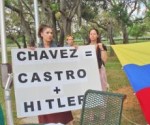Venezuelan ambassador’s visit sparks protest

Students and members of the community waved signs bearing the message “No Chavez” and “Chavez = Castro + Hitler,” outside the Business Administration building Wednesday to protest the presence of the Venezuelan ambassador in the United States.
Ambassador Bernardo Alvarez Herrera was invited to deliver a speech titled “Democracy in the Andean Countries in Latin America.” His presence sparked controversy among those who oppose Venezuelan President Hugo Chavez, who has been in power since 1999. One protester took issue with the title of Herrera’s lecture.
“I’m here because the ambassador of Venezuela is coming to talk about democracy,” said Demi Noack, a senior majoring in education. “Being Venezuelan, I don’t think we have a democracy. It’s very ironic.”
Herrera was brought to the University by the departments of Government and International Affairs, Africana Studies and the Institute for the Study of Latin America and the Caribbean (ISLAC). Juan Javier Jané, an international business major and member of ISLAC, said he was anxious to hear about Venezuelan politics.
“I want to hear what the ambassador has to say about the current political situation in Venezuela,” he said.
Herrera’s talk centered on relations between the United States and Venezuela. He said trades are increasing despite President George W. Bush’s stance against the administration.
“We have been qualified as an enemy but commercial trade has increased from $29 billion in 2004 to $50 billion in 2007,” he said.
Trade is increasing especially in Texas and Florida, Herrera said. Between 2005 and 2007, commercial trade between Venezuela and Florida increased 9.5 percent. He said Venezuela is the second destination for exports from Florida, increasing from 52.4 percent between 2005 and 2007.
Herrera said Venezuela does not want to follow the development model taken by the U.S. He characterized America as a consumptive society, in which natural resources are used recklessly.
“If we keep this model of development, we will need six additional planets of natural resources,” he said referring to Florida’s lack of viable public transportation, and the prevalence of large SUVs.
But many of the protestors called the Chavez government Communist and totalitarian.
“I’m protesting because the guy coming to talk to us today represents communism,” said protestor Raquel Ache-Leonard, “and Venezuela represents the worst Communist regime in the continent.”
Ache-Leonard waved the Venezuelan flag in protest and questioned the democracy of the country.
Official Venezuelan reports show Chavez was elected president by popular vote for a six-year term, and won a second term in 2006 with 62.9 percent of the vote.
Professor of government and international affairs Harry Vanden welcomed the audience and stressed the importance of not disrupting the speaker.
Despite Vanden’s instructions, protesters frequently interrupted the lecture to scream anti-Chavez remarks such as “no more Chavez” and “Communista!”
When Herrera said 60 percent of the Venezuelan population supports the presidency of Chavez, protests erupted.
A woman stood up and shouted “shame on you, ambassador.” She went on to yell “totalarista” and “communista.” She made her way to the exit screaming “no more Chavez.” Her shouts were met with loud applause, until a man in the crowd began chanting “Viva Chavez!”
Jorge Nef, chair of ISLAC, said he was not surprised by the presence of protestors.
“There is a rather large expatriate – but not yet exiled – community of Venezuelans in Tampa,” he said.
Though there were three undercover University Police (UP) officers at the lecture, at no point was anyone arrested or escorted out. Lt. Meg Ross, public information officer, was on hand.
“You try to avoid any type of public confrontation,” she said. “It’s a balance between protecting the speaker, not disrupting the speech and protecting people’s right to free speech,” Ross said.
In addition to being Venezuela’s ambassador, Herrera also serves on the Executive Committee to the Energy Council, is the principal coordinator for Venezuela in the Cooperation Agreement on Energy and is the head of the Venezuelan delegation to the Ministerial Conferences of the Organization of Petroleum Exporting Countries.
Freshman Boris Gershman said it was important to protest because he believes Chavez is leading the country in the wrong direction.
“I think it is important to protest against the ambassador because he said Venezuela is a democracy when he is taking the country into a communist direction,” Gershman said.
He said his family has long been against the Chavez administration and moved to Florida from Venezuela when he was 10.
“My whole family doesn’t support the president,” he said. “Chavez is ruining the country.”






